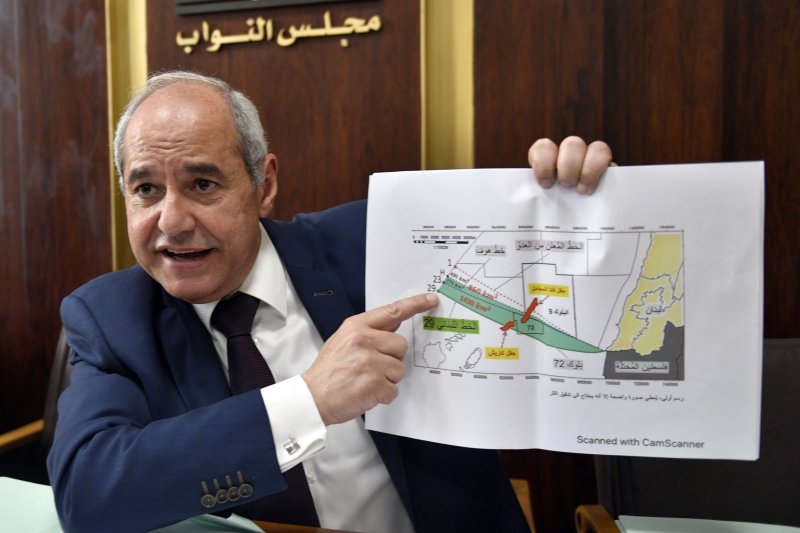

Member of the Parliament Melhem Khalaf shows a map of Line 29 at the Lebanese Parliament building in downtown Beirut on June 6. He said Israel began drilling for oil in some fields, including those adjacent to the Lebanese border.
BEIRUT, Lebanon, June 24 (UPI) — Europe’s growing need for gas caused by Russia’s war on Ukraine is increasing interest in speeding exploration and drilling of gas fields in the Mediterranean Sea — and pushing Lebanon and Israel to try settle their years-long maritime border dispute.
The arrival of a floating gas exploration ship, operated by London-based Energean, to the Karish field off the Mediterranean coast earlier this month has revived the dispute and raised tension between the two countries, which are still in a state of war.
The Karish field, which contains 1.4 trillion cubic feet of proved and probable gas reserves, is located south of the southern boundary of the disputed area.
The rising tension prompted the Lebanese government to call for stopping Israel’s exploration efforts and to ask Amos Hochstein, an American who has been mediating indirect talks since 2020, to intervene.
In a recent turn of events, Lebanon presented a new “more realistic” offer to Hochstein, a senior adviser for energy security at the U.S. State Department, during his visit to Beirut last week, an official source told UPI on the condition of anonymity.
“It is clear that it [demands] more than Line 23 and backed away from Line 29, which it considered as the negotiation line,” said the source, who has been involved in the negotiations for years.
Last year, the Lebanese delegation to the talks, made up of Army generals and experts, presented a new map that would add 550 square miles (referred to as line 29) to the disputed 330 square mile area (referred to as line 23) of the Mediterranean Sea that each side claims is within their own exclusive economic zones. The negotiations stopped while Lebanon never officially claimed Line 29, which would give it part of the Karish field.
Debt-stricken Lebanon, which hopes to enter the club of oil producers, has wasted almost a decade adopting different delimitation methods and negotiation tactics. Israel, meanwhile, has developed offshore natural gas rigs and started exploration activity outside the disputed area, which is potentially rich in oil and gas and that both countries claim.
Lebanon, the source said, is waiting for Hochstein to come back with Israel’s reply to its new proposal, which would give the Karish field to Israel and the Qana field to Lebanon.
He emphasized that his country “will never accept, not now nor tomorrow nor next week, that Israel keeps on drilling in an area that they allegedly claim is outside the disputed zone while we cannot do the same in our own area,” the Qana field
A consortium of international companies, Total, ENI and Novatek, were awarded the right to explore in 2018 with the aim to find natural gas, but “have been pressured not to start drilling” in the Qana field, according to the source.
He, however, noted that Hochstein confirmed Israel’s gas-drilling rig, stationed in the Karish gas field, is located in Israeli territory and will not pump gas from the disputed area.
That might have, at least temporarily, defused tension that reached “a dangerous level,” with Lebanon’s heavily armed Iran-backed Hezbollah and Israel exchanging threats over Karish gas drilling, according to the source.
Hezbollah chief Hassan Nasrallah warned that it will not allow Israel to extract gas from the field until negotiations with Lebanon are completed. Israeli Army Chief Aviv Kochavi threatened to respond with “overwhelming force” in any next war with Hezbollah.











